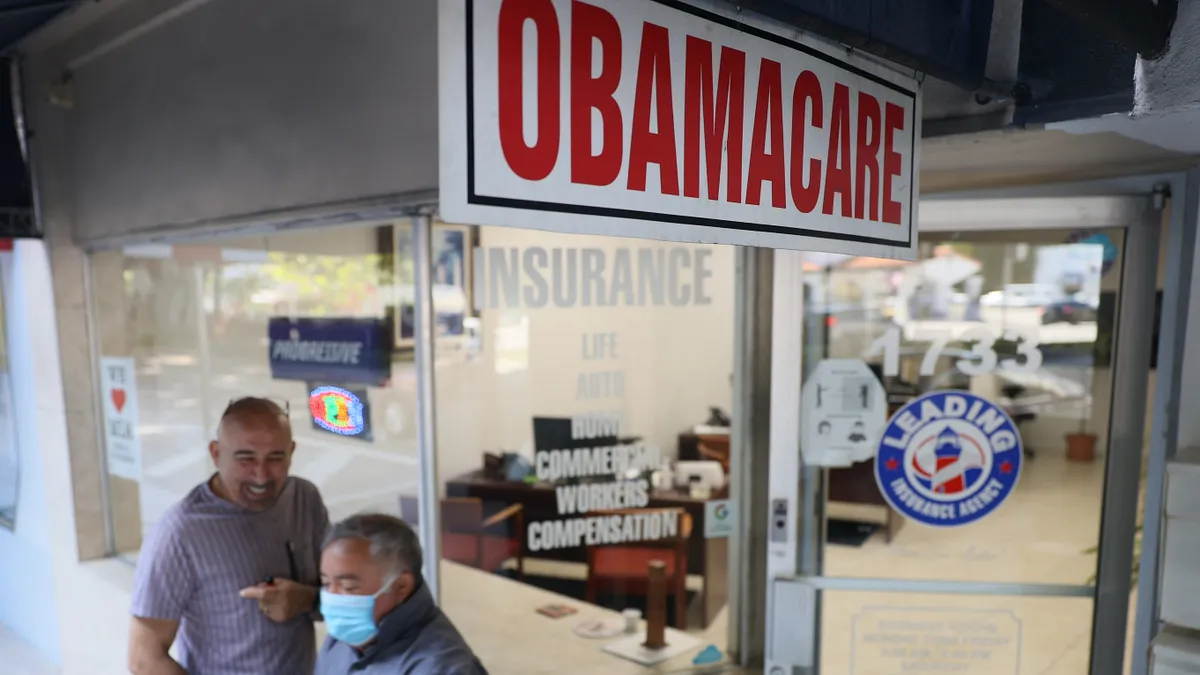Dive Brief:
- Four million people could become uninsured if more generous federal subsidies for health plans on the Affordable Care Act exchanges are allowed to expire after 2025, according to an analysis by the Urban Institute.
- The impact won’t be felt evenly across the country. Nearly 2.5 million of the newly uninsured would live in the 10 states that haven’t yet expanded Medicaid under the ACA, the think tank said.
- Overall, the report estimates the uninsurance rate would increase by 16% and subsidized marketplace coverage would fall 42% if the enhanced premium tax credits expire — more likely now that Republicans will control Congress and the White House next year.
Dive Insight:
A change in administration in 2025 may set up a battle over the enhanced subsidies, which are set to expire at the end of next year without action from lawmakers.
Beneficiaries with incomes between 100% and 400% of the federal poverty level saw higher premium tax credits under the financial assistance, which was enacted during the COVID-19 pandemic in 2021.
People with incomes above 400% of the federal poverty level could also qualify for the subsidies when they previously were ineligible for assistance.
Proponents — including the Biden administration — say the enhanced tax credits helped boost enrollment in the ACA exchanges, which insured a record-breaking 21.3 million people this year. Democrats introduced legislation in September to preserve the enhanced premium tax credits.
But Republicans have raised concerns that the financial assistance is too costly and creates opportunities for fraud. The Congressional Budget Office estimates making the financial assistance permanent would increase the budget deficit by $335 billion between 2025 and 2034.
Cutting the subsidies, however, could have serious implications for coverage, according to the Urban Institute’s analysis. If the enhanced premium tax credits expire after 2025, more than 7 million fewer people could have access to subsidized plans — increasing their healthcare costs.
“Allowing these credits to expire will force families to choose between healthcare and other necessities like housing and food,” said Kathy Hempstead, senior policy adviser at the Robert Wood Johnson Foundation, which contributed to the report. “The implications will be profound, with the ripple effects being felt across the entire U.S. economy.”
The coverage losses could be particularly serious in states that haven’t expanded Medicaid eligibility to residents with incomes up to 138% of the federal poverty level.
Without Medicaid expansion, people can enroll in Marketplace plans with incomes of 100% of the federal poverty level or more, a more expensive prospect without the subsidies.
Although the 10 states that haven’t expanded Medicaid — Alabama, Florida, Georgia, Kansas, Mississippi, South Carolina, Tennessee, Texas, Wisconsin and Wyoming — make up 28% of the nonelderly population, they would account for 63% of the enrollment decline in subsidized exchange plans, according to the Urban Institute's analysis.
Race and ethnicity will also have an impact, the report found. In nonexpansion states, the uninsurance rate would increase by 4.2 percentage points among Black and Hispanic people, compared with 2.6 percentage points among white residents.
Younger and middle-aged adults will be more likely to leave the ACA exchanges or become uninsured too. That decline could create other issues for the marketplace, as younger and healthier beneficiaries help keep premiums lower for other enrollees, according to the analysis.















